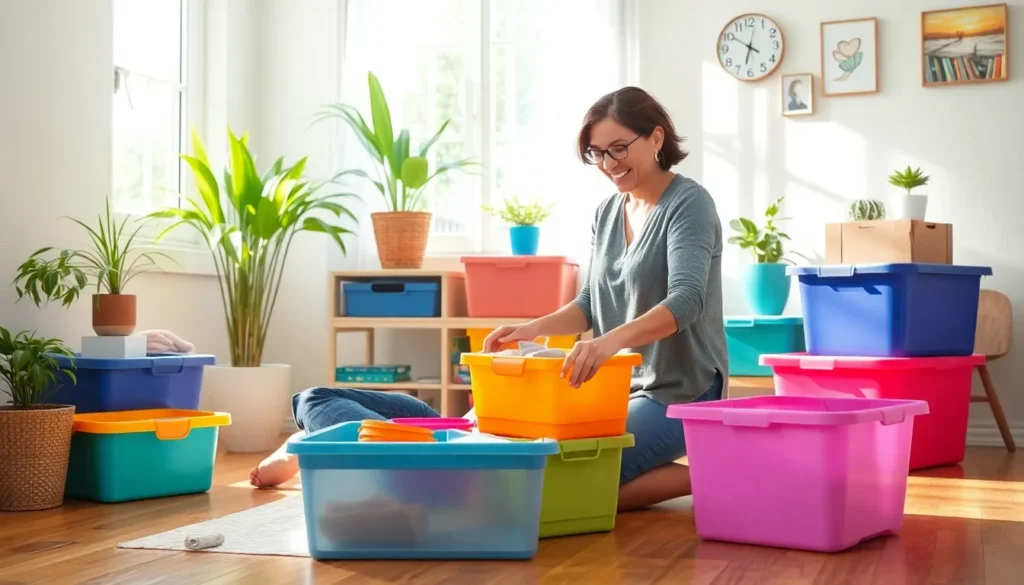Table of Contents
ToggleClutter’s like that uninvited guest who overstays their welcome, turning homes into chaotic obstacle courses. It sneaks up when you’re not looking, multiplying like rabbits until you’re convinced your living room is auditioning for a reality TV show. But fear not! Decluttering and cleaning don’t have to feel like a punishment.
The Importance of Decluttering and Cleaning
Decluttering and cleaning significantly enhance mental clarity. Clutter can create stress, making it challenging to focus on tasks. A tidy environment fosters productivity and boosts overall mood. Regular cleaning practices help maintain a sense of order and calm.
Physical benefits abound as well. Improved air quality results from cleaning surfaces and minimizing dust. Organizing spaces can lead to better accessibility, ensuring that essential items are easy to find. Additionally, decluttering reduces the risk of accidents caused by tripping over misplaced items.
Emotional well-being improves when spaces are clear. A clean home often leads to increased feelings of accomplishment and satisfaction. Furthermore, creating a welcoming atmosphere for guests becomes easier with an orderly environment.
Making room for essential possessions also matters. Eliminating unnecessary items often reveals space for meaningful belongings. It allows individuals to recognize what they truly value and appreciate.
Establishing routines in maintenance proves beneficial. Short, consistent cleaning sessions can prevent overwhelming situations. Using checklists or schedules ensures that all areas receive attention, creating a harmonious space.
Adopting a minimalist mindset can drive decluttering efforts. One can focus on quality over quantity, leading to more intentional acquisitions. Evaluating what truly adds value to life fosters a less chaotic atmosphere.
Clear spaces often reflect personal growth and change. Transforming a cluttered environment can mirror positive changes in mindset. Overall, embracing decluttering and cleaning invites clarity, serenity, and well-being into everyday life.
Benefits of a Decluttered Space

A decluttered space cultivates numerous advantages that enhance daily living experiences. Embracing cleanliness fosters an organized environment, which directly influences overall well-being.
Enhanced Mental Clarity
Removing physical clutter significantly boosts mental clarity. Clutter often distracts attention, making it difficult to concentrate on important tasks. Clearing out unnecessary items leads to a more serene atmosphere. A tidy space promotes clearer thinking and improved decision-making. Many report reduced stress levels following a decluttering spree, finding that an organized environment cultivates a sense of calm. Decluttering not only opens physical space but also helps individuals compartmentalize their thoughts, fostering a positive mental state.
Improved Productivity
An organized environment enhances productivity levels remarkably. With fewer distractions, individuals can focus better on their tasks. Finding essential items becomes easier in a decluttered area. The speed and efficiency often increase as individuals waste less time searching for misplaced objects. A clean workspace inspires creativity and innovation, leading to more effective problem-solving. People frequently experience a surge in motivation when surrounded by order, encouraging them to pursue goals actively. Increased productivity translates into a sense of achievement, reinforcing the advantages of maintaining a clutter-free space.
Decluttering Strategies
Effective decluttering strategies simplify the process of creating an organized environment. Implementing these methods allows individuals to reclaim their space and boost their well-being.
The Four-Box Method
The Four-Box Method categorizes items into four distinct boxes: keep, donate, discard, and relocate. He or she evaluates each item and places it in the corresponding box. This clear categorization clarifies decision-making, reducing the likelihood of retaining unnecessary items. Consistent use of this method facilitates progress, as it provides immediate visual feedback on clutter reduction. Many people find that revisiting the categories energizes the decluttering process and promotes a more thoughtful approach to belongings.
The Minimalist Approach
The Minimalist Approach advocates for prioritizing quality over quantity. Individuals adopting this method assess their possessions and identify those that add true value to their lives. Focusing on essential items creates a sense of freedom and tranquility in their living spaces. This approach promotes intentional living and cultivates gratitude for what one owns. Regular reflection on possessions encourages continuous improvement while fostering an environment conducive to inspiration and creativity. Embracing minimalism supports sustainable living through mindful consumption and reduces stress associated with physical clutter.
Effective Cleaning Techniques
Cleaning routines and deep cleaning strategies simplify maintaining a tidy space. Utilize daily practices and deep cleaning tips to create an organized environment.
Daily Cleaning Routines
Daily cleaning routines foster a sense of order and prevent clutter accumulation. Start each day by making the bed and tidying surfaces. Wipe down kitchen counters and tables after meals to maintain cleanliness. Designate specific times for quick clean-ups, like a 10-minute sweep of living spaces. Encourage family members to participate by assigning simple tasks, such as putting items back in their place. Focus on one area each day, rotating through rooms to ensure thorough maintenance. This continuous effort supports a peaceful atmosphere, enhancing overall well-being.
Deep Cleaning Tips
Deep cleaning ensures a more thorough cleaning process that goes beyond daily routines. Create a checklist to tackle various areas systematically. Begin in one room, focusing on high-traffic spots like bathrooms and kitchens. Move furniture to clean hidden areas and dust surfaces thoroughly. Utilize specialized tools like microfiber cloths for efficient cleaning. Allocate specific days for deep cleaning tasks, such as emptying the refrigerator or cleaning windows. By establishing a seasonal routine, individuals maintain a fresh and welcoming home environment, elevating both aesthetics and functionality.
Maintaining a Clutter-Free Environment
Establishing a clutter-free environment requires consistency in daily habits. Incorporate simple routines that promote tidiness. Setting aside time each day for quick clean-ups helps maintain order. Designate a specific area for items that don’t belong, making it easier to return everything to its rightful place.
Create a systematic approach to decluttering by regularly evaluating possessions. Schedule monthly reviews to assess the relevance and value of items. Donate or discard anything that no longer serves a purpose in daily life. Consistency fosters a mindset that prioritizes quality over quantity.
Involve family members in maintaining cleanliness. Assign tasks to everyone, facilitating shared responsibility for a tidy home. Encouraging teamwork not only lightens the burden but also builds a sense of community within the household.
Daily cleaning habits are equally crucial. Begin each day with small tasks such as making the bed and clearing surfaces. Celebrating these achievements contributes to a sense of accomplishment. Additionally, utilize checklists to ensure thoroughness in cleaning routines, focusing on high-traffic areas that require extra attention.
Implementing a seasonal deep-cleaning schedule also supports a clutter-free space. This approach allows for a detailed assessment of hidden areas, fostering thorough maintenance. Investing time in these practices leads to cleaner air quality and greater accessibility to essentials.
Emphasizing the benefits of a clean environment reinforces the motivation to maintain order. A tidy space promotes mental clarity and reduces stress, enhancing overall well-being. Adopting these strategies promotes a lifestyle that values cleanliness and encourages a balanced, fulfilling living space.
Embracing decluttering and cleaning transforms living spaces into serene environments. A tidy home not only enhances mental clarity but also boosts productivity and overall well-being. By adopting effective strategies and maintaining consistency, individuals can create a sanctuary that reflects their values and aspirations.
Fostering a minimalist mindset encourages intentional living and gratitude for meaningful possessions. Regular cleaning routines and family involvement further solidify a sense of community and shared responsibility. As individuals celebrate small victories in their decluttering journey, they pave the way for lasting change and a more fulfilling life. Ultimately, a clear space invites clarity and peace, making daily life more enjoyable and manageable.




